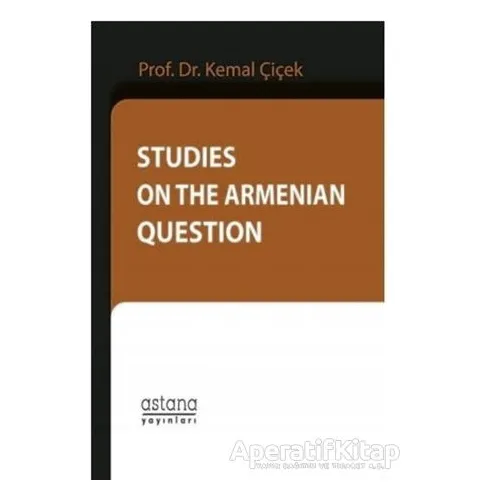Studies On The Armenian Question - Kemal Çiçek - Astana Yayınları
Hiç mesaj bulunmadı
| Taksit | Tutar | Toplam |
|---|---|---|
| Tek Çekim | 207.00 TL | 207.00 TL |
| 2 Taksit | 103.50 TL | 207.00 TL |
| 3 Taksit | 71.76 TL | 215.28 TL |
| 4 Taksit | 54.34 TL | 217.35 TL |
| 5 Taksit | 43.88 TL | 219.42 TL |
| 6 Taksit | 36.92 TL | 221.49 TL |
| Ödeme Türü | Toplam Tutar |
|---|---|
| Diğer Kredi Kartları | 207.00 TL |
| Havale / Eft | 207.00 TL |
| Posta Çeki | 207.00 TL |
| Kapıda Ödeme | 222.00 TL |
Kapıda ödemeli siparişlerde +15,00TL kapıda ödeme hizmet bedeli ilave edilir. | |
- Vade farksız taksitler KOYU renkte gösterilmektedir.
- X+X şeklinde belritilen taksitler (Örneğin: 2+3) 2 taksit olarak işleme alınmakta ancak ilgili bankanın kampanyası dahilinde 2 taksit üzerinden işlem yapıldığı halde 2+3 yani 5 taksit olarak kartınıza ve ödemenize yansımaktadır. (2 taksit seçilmiş olsa bile banka kampanyası dahilinde ekstradan vade farkı eklenmeden işlem 5 taksite bölünmektedir.)
Studies On The Armenian Question - Kemal Çiçek - Astana Yayınları
The Armenian Question is part of a larger problem, formulated under the name The Question of the Orient”, which has been brought up in different forms at different times and places. Throughout history, it is part of the games that have been played countless times against the Turkish people and state. Again, this problem constitutes a different face of the imperialist politics applied by the great states throughout the Balkans, the Caucasus, the Middle East and Anatolia throughout history. Although those who direct the issue of relocation” have acted individually or collectively, the target has always been the Turkish people
and state. This valuable work of Kemal Çiçek seeks an answer to this question. It is an extremely rigorous and, most importantly, an impartial study. In addition, this book provides sound information not only for scholars, but also for the general reader who is interested in this problem.











